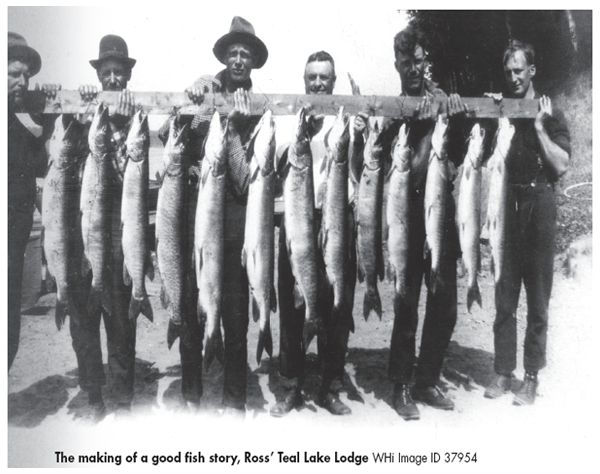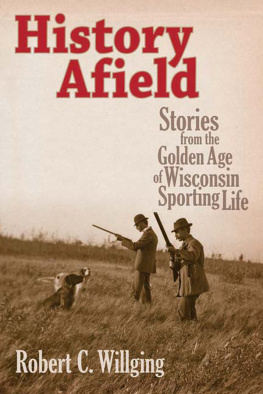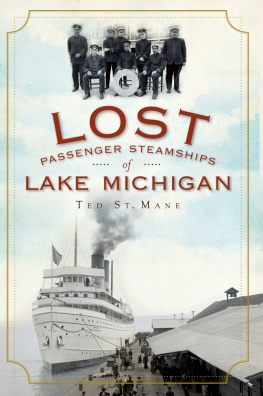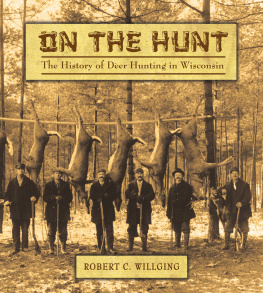I am particularly grateful for the support and assistance provided by Mitch Mode, Rhinelander; Joel and Janet McClure, Phelps; Leon Pastika, Hayward; Wendy Robinson, Rhinelander, and her mom Doris Goldsworthy, Three Lakes; Tim and Prudence Ross, Hayward; Mike Sheldon, Antigo; Rich Devlin, Enterprise; Joy Vancos, Rhinelander; Jim Montgomery, Rhinelander; Ken Schels, Eagle River; Neal Lendved, Green Bay; Ducky and Laurel Reed, Oconto; and Sue and Al Rosenquist, Hayward.
Several people I interviewed for the column are now deceased. The very reason they had so much to share was that they had lived long lives full of memorable experiences. Those who have passed on have left an indelible mark in my mind. They include John and Mary Barth, Pardeeville; Vern Frechette, Washburn; Marv Kaukl, Poynette; John Mistely, Enterprise; Vernon Duke and Dorothy Montgomery, Rhinelander; and sisters Shirley Sleight and Dorothy Uthe, Mercer.
The expertise and support of the Wisconsin Historical Society Press, including John Motoviloff, Laura Kearney, Kathy Borkowski, Kate Thompson, Rachel Cordasco, and the talented production staff, contributed greatly to the development and successful completion of this book.
There is always a quiet corner to write at the Rhinelander District Library, and I'd like to thank the staff there. A rare operating Andrew Carnegie libraryalthough it has expanded from the original 1903 Carnegie grant portionRhinelander's free library is an ongoing example of the enormous importance of public libraries to a democracy.
Chapter 1
Fish Stories

Fishing is certainly one of the oldest recreational activities in human history. Following close behind is telling stories about fishing. Through the years fish stories have often made the pages of Wisconsin newspapers and magazines.
A Rhinelander-area newspaper, The New North, ran this story in 1912:
The best fish story of the season comes from Three Lakes. The tale was sworn to before a justice of the peace by John Smith, a witness. John Barry, a Chicago banker, was the angler.
Barry was fishing with a small hook for bait. A minnow became fastened on the hook. A one pound black bass spied the minnow and grabbed him whereupon a large musky observed Mr. Bass and swallowed hook, minnow, and bass. By careful maneuvering and expert skill Barry landed the finny triothree fish on one hook.
Another multiple-fish story from Three Lakes, this one in 1965, was reported by the Rhinelander Daily News:
Dale Bruss, new English teacher and assistant basketball coach at the high school here, hooked a 12- or 13-inch northern and landed an 18 pound, five ounce musky instead, Friday.
Bruss was fishing in Range Line Lake and hooked the northern, with a small daredevil, but everything became a blur when a musky, evidently chasing the northern, jumped into the boat.
I dropped my pole and picked up an oar to kill the musky, said Bruss. He managed to daze the fish long enough to get to shore where he and a neighbor used a gaff hook and gaffed the fish.
Muskies were often the subjects of northwoods newspaper reports. In 1914 a northern Wisconsin newspaper carried the story with the exciting headline: Big Fish Swamps Boat: Two Fishermen Nearly Drown While Trying to Land Musky.
The article went on to describe the perilous event:
While attempting to land a giant muskallonge [sic] Saturday afternoon Leon Gorman and Fred Pecor had a narrow escape from drowning in the Wisconsin River near Rainbow Rapids.
Mesrrs. Gorman and Pecor were trolling in a row boat when the former gentleman hooked the big fish. In the battle which followed the boat tipped over, throwing the occupants into the stream. Both would probably have lost their lives had not a nearby fisherman in another boat hurried to their rescue.
The musky was lost, but Gorman related that it was the largest muskallonge [sic] he had ever seenit looked to him as huge as a shark.
A big brown trout was the culprit in a near drowning according to a 1937 story in The Wisconsin Sportsman:
A tackle-busting old timer, famous in his home territoryNorth Branch creek, north of Hixtongave an angler from Melrose a mighty battle on opening day. This big German brown, nine pounds of dynamite, took a smash at an appetizing something or other, only to find it was attached to a rod. Ire aroused, he proceeded to rip around with fervor. The un-named angler, evidently knowing of this grandaddy trout's past tackle-busting history, doubted his own ability to land the fish according to the usual procedure. So he handed his rod to a companion, plunged into the icy water. Grabbing the struggling trout in his arms with much difficulty, he headed for shore. Extremely irked, Mr. Trout summoned up his strength, gave one more big wriggle, tossing the fisherman backwards into deep water, to nearly drown before he was pulled out by bystanders.
A fish of a different sort, not usually known for an aggressive nature, was responsible for chasing two young fishermen from their boat, according to another Wisconsin Sportsman report in 1937:
It happened near Oakwood Beach on Lake Winnebago, this genesis of a whopper of a fish story. Harry Mitchell and Robert Kramer, both 14, were rowing along in their boat when a huge fish leaped out of the water and landed in their craft. Startled and confused, both boys leaped from the boat to the comparative safety of the fish's own backyardthe lake. Recovering from their fright, the boys mustered up courage to ease back to the boat to investigate. They found a large carp still floundering around in the bottom of the boat, which they pushed to shore, where they dumped the 12 pound specimen which soon they were exhibiting with pride. The incident sets some sort of record it is believed.
A battling wall-eyed pike chased a woman not only from her boat but completely off Lake Mendota, according to another report from 1937: Charging that a battling wall-eyed pike chased her off Lake Mendota after she hit him with an oar, Mrs. Austin Forkner reported that she finally got to the beach, landed the 30-inch specimen with a net.









